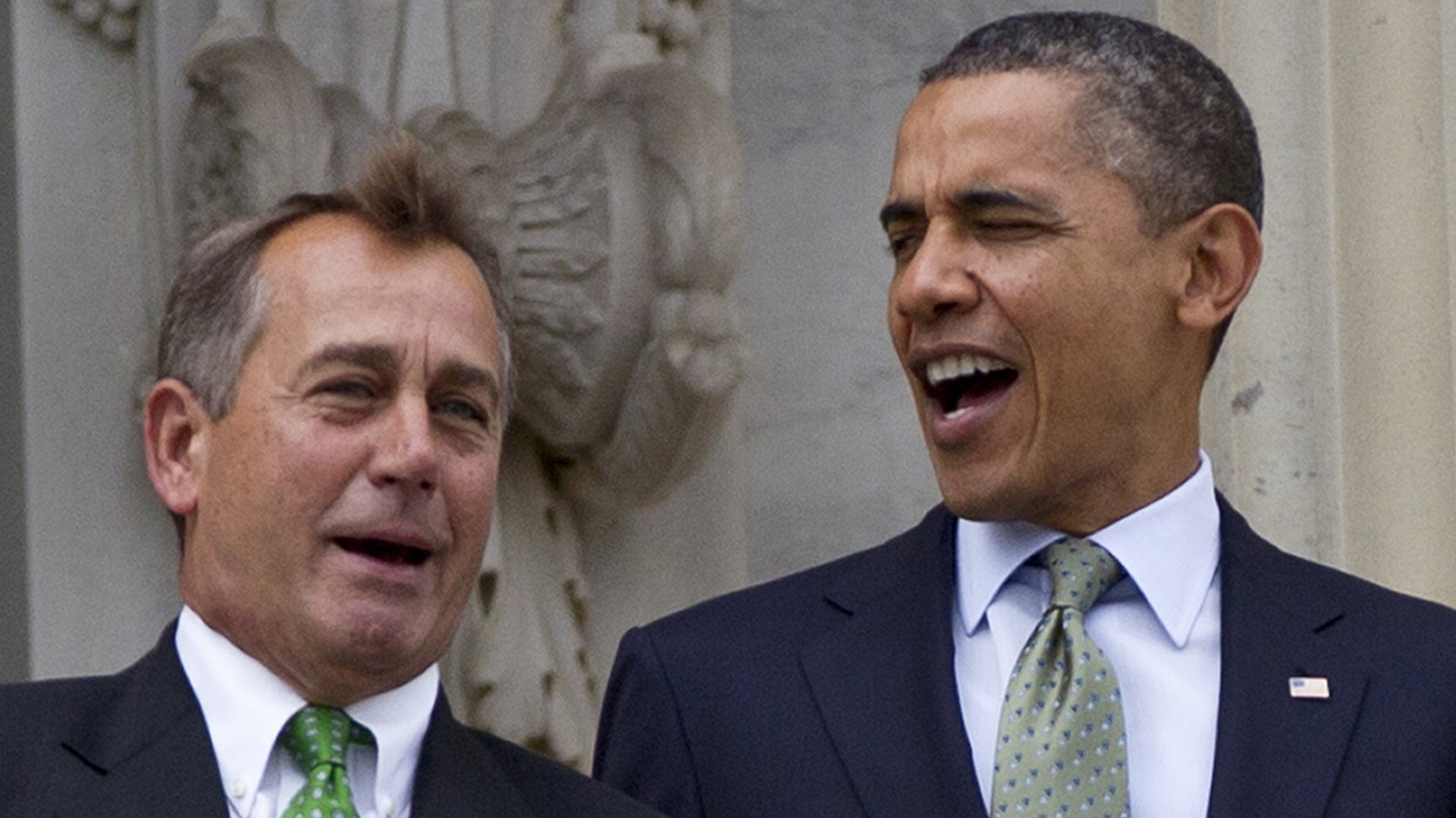The fiscal cliff deal shaping up between Obama and Boehner
The last time President Obama and Speaker of the House John Boehner tried to make an emergency budget deal was during the US sovereign debt showdown in the summer of 2011. Their attempt at bipartisanship failed, leading to a downgrade of America’s credit rating and the set of austerity policies that make up the fiscal cliff: sharp tax hikes and spending cuts due to take effect at the end of this year.


The last time President Obama and Speaker of the House John Boehner tried to make an emergency budget deal was during the US sovereign debt showdown in the summer of 2011. Their attempt at bipartisanship failed, leading to a downgrade of America’s credit rating and the set of austerity policies that make up the fiscal cliff: sharp tax hikes and spending cuts due to take effect at the end of this year.
But times have changed, and with the presidential election behind us, both Obama and Boehner have now offered their opening bids. So it’s worth translating the dense language of politics in the context of the bargain that the White House and the Speaker nearly struck the first time around.
What Boehner and Obama refer to as “revenue” can be generated in two ways, which aren’t mutually exclusive: an economic expansion or changes to tax policy. It’s ridiculous to think that an expansion alone would do the trick, and some Republicans are coming around to that view. As for tax policy, there’s raising rates, which is a pretty straightforward tax hike, or closing loopholes and deductions, which would also constitute a tax hike but a more rhetorically palatable one.
The plan back in 2011 was a fairly ambitious fiscal consolidation deal, raising $800 billion in tax revenue and cutting $1.7 trillion in spending, including social insurance programs; neither party will accept one without the other. Like plans proposed by the Bipartisan Policy Center or the Bowles-Simpson commission, it included a tax reform package that would end tax loopholes, allowing overall tax rates to come down. The tax reform would be “revenue neutral,” but the solution proposed by Boehner was to start by assuming some of the tax cuts passed by the Bush administration would expire. This accounting trick would allow anti-tax legislators to vote for lower taxes, but, starting from a higher ground, raise more revenue.
At the time, competing plans and threats of revolt from conservative Republicans led the deal to collapse. But the current situation must feel like deja vu to Boehner, who came to a press conference with reporters the day after the election with a simple message-cum-trial balloon: “Because the American people expect us to find common ground, we are willing to accept some additional revenues, via tax reform.”
Nice and conciliatory! Boehner made certain he was on the record opposing revenue raised by higher tax rates, while arguing that a faster-growing economy would naturally supply more revenue. He then described a combination of entitlement and spending cuts to go along with tax reform reminiscent of his 2011 proposal. In true political style, he left open the question of whether he would be open to a deal that would raise revenue to reduce the deficit without raising rates, as in the 2011 deal, or whether he was just relying on the discredited notion that tax cuts could pay for themselves.
Luckily, we don’t need to speculate about Boehner’s assumption because we’re experiencing something of a baseline convergence: With the arrival of the fiscal cliff and the expiration of decades of temporary tax policy, Obama can allow taxes to increase to pre-Bush administration levels regardless of what Congress decides. The president’s bargaining position is much better in this environment, putting pressure on recalcitrant Republicans to follow Boehner into a balanced deal. After two elections in which Obama promised to raise taxes on the wealthy, it’s hard to argue that the public hasn’t spoken on the issue.
You certainly saw that in when Obama made his first remarks after the election. He reiterated his campaign position on taxes, announcing that he would sign an extension of the Bush administration’s tax cuts for middle class families immediately, but he would not extend them for families who earn more than $250,000 a year. That’s near the revenue baseline that Boehner proposed last time. Obama did not say anything about tax rates, and complimented Boehner’s remarks.
There may be room for a deal. Consider this interview with Republican Senator Saxby Chambliss, who has also endorsed plans that includes revenue increases and spending cuts and spoke with Boehner about his proposal. Chambliss says he doesn’t think revenue increases based on hopes for economic expansion will be credible, since the non-partisan agency that scores budget measures doesn’t count them.
“I don’t think there is any way to not have additional revenue on the table from a CBO-projected standpoint,” Chambliss said, referring to the Congressional Budget Office. “That’s what the markets are going to pay attention to.”
So is this the rickety deal to bring everybody to the table? Boehner says the lame duck Congress’ near-term task is to divert the initial impact of the fiscal cliff, and Congressional leaders have been invited to meet at the White House next week to begin negotiations.. There are a million ways this early momentum could be diverted into brinkmanship, starting with conservatives refusing to accept tax increases or a more liberal Senate pushing back on spending reductions, but in the early moments after the election, moderate Republicans are finding more gumption when it comes to finding common ground.